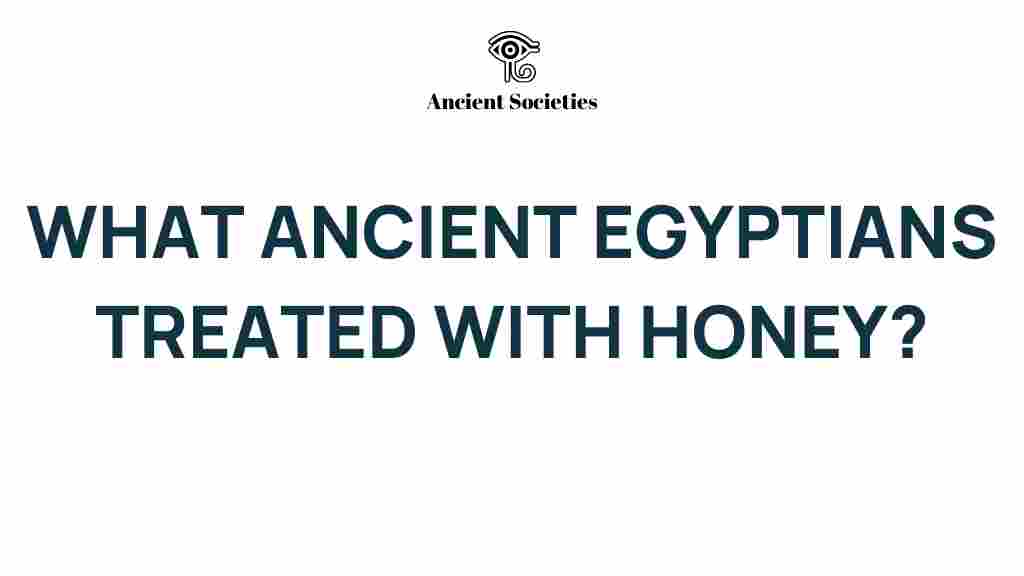The Sweet Secrets of Ancient Egyptians: Honey’s Healing Powers
The ancient Egyptians are renowned for their remarkable civilization, known for its monumental architecture, art, and sophisticated culture. Among their many contributions to the world, one of the most fascinating is their use of honey. This golden substance was not only a staple in their diet but also a vital component of their medicine and healing practices. In this article, we will explore the rich history of honey in ancient Egyptian culture, its medicinal properties, and its role in agriculture and food preparation.
Honey in Ancient Egyptian Culture
Honey was highly valued by the ancient Egyptians, not just as a sweetener but as a fundamental part of their culture and daily life. It was used in religious rituals, as offerings to the gods, and in the embalming process for mummies. The ancient Egyptians believed that honey had divine properties and was a gift from the gods.
The Historical Significance of Honey
Archaeological findings have shown that honey was used in ancient Egyptian society as early as 3000 BC. It was found in tombs, suggesting its importance in the afterlife. Honey was often included in burial goods, indicating that it was considered a valuable item that could provide sustenance in the next life.
- Ancient texts mention honey as a remedy for various ailments.
- It was believed to have the power to prolong life and promote health.
- Honey was also used to sweeten drinks and food, making it a staple in the ancient Egyptian diet.
Honey as Medicine
The ancient Egyptians were pioneers in medicine, and honey played a crucial role in their healing practices. Its natural antibacterial and antifungal properties made it an effective treatment for wounds and infections. Honey was often used in the following ways:
- Wound Healing: Honey was applied to wounds to promote healing and prevent infection.
- Digestive Health: It was consumed to alleviate digestive issues.
- Skin Care: Honey was used in various ointments for skin conditions.
The Healing Powers of Honey
Modern science has validated many of the ancient Egyptians’ beliefs about honey’s healing powers. Research has shown that honey contains various compounds that contribute to its medicinal properties:
- Antioxidants: Honey is packed with antioxidants that help combat oxidative stress in the body.
- Antimicrobial Properties: Its natural ability to inhibit the growth of bacteria makes it an effective treatment for infections.
- Anti-inflammatory Effects: Honey can reduce inflammation, making it beneficial for various health conditions.
Common Remedies Using Honey
Here are some traditional remedies that the ancient Egyptians might have used with honey:
- Honey and Milk: A soothing drink for coughs and colds.
- Honey and Lemon: A remedy for sore throats.
- Honey Ointments: Used for treating wounds and burns.
The Role of Honey in Ancient Egyptian Agriculture
The ancient Egyptians were skilled agriculturalists, and honey production was an important part of their farming practices. Beekeeping was widely practiced, and the ancient Egyptians developed techniques to cultivate bees and harvest honey.
Beekeeping Techniques
Beekeeping in ancient Egypt involved using simple hives made from clay or woven baskets. The Egyptians understood the life cycle of bees and how to manage them effectively. They would:
- Place hives near flowering plants to ensure a steady food supply for the bees.
- Harvest honey without harming the bee population.
- Use beeswax for various purposes, including cosmetics and embalming.
Honey in Ancient Egyptian Food
Honey was not only a medicinal substance but also a crucial component of the ancient Egyptian diet. It was used in various food preparations, enhancing flavors and providing natural sweetness to many dishes.
Culinary Uses of Honey
Some of the ways honey was used in ancient Egyptian cuisine include:
- Sweetening Foods: Honey was a primary sweetener in a time when sugar was unknown.
- Fermentation: Honey was used to produce mead, an alcoholic beverage.
- Preservation: Honey’s natural preservative qualities were utilized to store fruits and other perishables.
Modern Applications of Ancient Egyptian Honey Remedies
The legacy of ancient Egyptians’ use of honey continues today. Many people incorporate honey into their health and wellness routines, drawing on the wisdom of the past. Here are some modern applications:
- Natural Sweetener: Honey is often used as a healthier alternative to refined sugars.
- Home Remedies: Many people use honey for sore throats, coughs, and skin ailments.
- Cosmetics: Honey is a popular ingredient in skincare products for its moisturizing properties.
Troubleshooting Tips for Using Honey in Remedies
While honey is generally safe and beneficial, here are some tips to ensure you get the most out of your honey remedies:
- Choose Raw Honey: Opt for raw, unprocessed honey to retain maximum health benefits.
- Avoid Heat: Do not heat honey excessively, as this can destroy its beneficial properties.
- Check for Allergies: Some individuals may be allergic to honey; always do a patch test before using it on the skin.
Conclusion: Embracing the Legacy of Ancient Egyptians and Honey
The ancient Egyptians understood the remarkable healing powers of honey long before modern medicine validated its benefits. From its role in agriculture to its use in food and medicine, honey was a vital part of their culture and everyday life. As we continue to explore the intersection of ancient wisdom and modern science, honey remains a cherished remedy and ingredient in our lives.
By embracing the legacy of the ancient Egyptians and their sweet secrets, we can incorporate honey into our health and wellness routines, appreciating not only its flavor but also its profound healing properties. Discover more about the fascinating history of honey and its uses in traditional medicine here.
For more information on the benefits of honey and how to use it in your daily life, check out this comprehensive guide.
This article is in the category Culture and created by AncientSocieties Team
